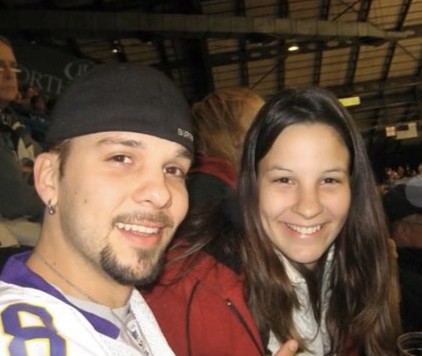
Caption: Faith Carlson with her brother, Andrew
Faith Carlson, a Clinical Therapist specializing in eating disorder treatment at Victus Counseling, was drawn to the field after learning that eating disorders have the highest mortality rate of any mental health condition, second only to opioid use disorder. She wanted to make a difference in helping those struggling with this life-threatening illness. As the only certified provider in South Dakota, Carlson frequently faces barriers that limit her ability to provide effective treatment, particularly with insurance-covered care, including fewer treatment options, denials, delays, and burdensome preauthorization requirements.
Carlson deeply understands the importance of access to mental health services and is acutely aware of the challenges and urgency individuals face when seeking help. After losing her brother, Andrew, to suicide in 2023, her commitment to advocating for mental health care grew even stronger. “People — brothers, sisters, children — are passing away from mental health illnesses. When access to services and barriers exist to getting care, lives are impacted. It has a real human life cost,” she said.
“When access to services and barriers exist to getting care, lives are impacted.”
Carlson’s patients face significant barriers, including opaque and sometimes unfair insurance restrictions, leaving them overwhelmed and at risk about if their care will be covered or if they’ll be paying out-of-pocket. As she explains, “This puts people in crisis. They already feel overwhelmed, they’re struggling to survive day-to-day, let alone trying to figure out who to call on the insurance end.”
The consequences can be fatal. One of Carlson’s first patients tragically died after being dropped from insurance and unable to secure the care needed. “It was such a devastation for me. I was doing everything I could to stabilize and support this client, but the reality was that there weren’t resources available,” Carlson explains. “These clients are passing away.”
“These clients are passing away.”
Nearly 1 in 10 Americans will experience an eating disorder in their lifetime, impacting millions. Carlson has a growing waitlist, with patients willing to travel long distances to see the only certified specialist in the area. Unfortunately, workforce shortages for behavioral health professionals are expected to worsen, and a lack of mental health parity enforcement can exacerbate the issue. As Carlson notes, “For one therapy hour, it’s two to three hours’ worth of work that’s not paid,” leaving her with a wage that is not livable.
“For one therapy hour, it’s two to three hours’ worth of work that’s not paid.”
Carlson underscores that investing in treatment on the front end can prevent costlier care, such as emergency room visits or inpatient treatment. “We need to keep people in their families, schools, and communities,” she said. “Parity enforcement would allow me to focus on my clients, helping them improve, function in society, and be the best versions of themselves.”
In her final thoughts, Carlson emphasizes the profound impact that proper support and care can have on individuals, families, and entire communities. “The work we do is critical, and with the right resources, we can help individuals not only survive but thrive.”
Voices in Parity highlights the real people experiencing mental health parity issues. Are you a person seeking mental health treatment who was denied care, or a provider dealing with mental health parity issues? Email info@thekennedyforum.org to tell your story.

